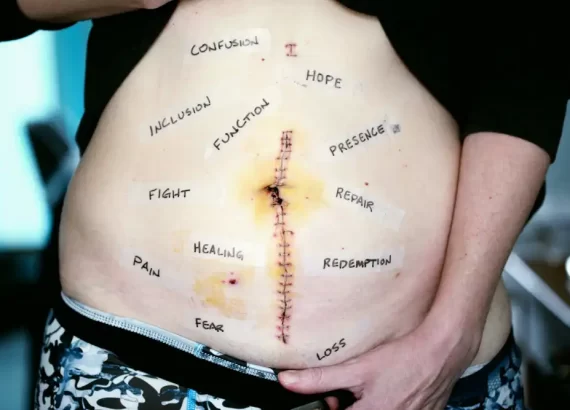A Brief Guide for Trauma and Anxiety

Author: Rebecca Blankenship
Trauma can have a major impact on the way individuals regulate emotions, view themselves, interact in the world with others, and so much more. At Mind Space Counseling our skilled team of therapists is here to help you understand trauma.
What Trauma is and How it Works
Trauma occurs when an individual experiences an event that threatens their safety, or the safety of those they care about. Examples of traumatic events include: physical violence, sexual assault, motor vehicle accidents, natural disasters, exposure to war or other violence, and any event threatening safety.
Traumatic events can also be complex with multiple events, such as domestic violence or childhood abuse.
Trauma can act to rewire the brain, affecting an individual’s ability to regulate emotions, especially anxiety. If we imagine pathways in the brain as a road system, under normal traffic conditions we would observe a situation, make our interpretations, or thoughts, about it, evaluate our options, make a plan, and then act.
In the case of a traumatic event, an alarm sounds, and that same road system now goes into the express route. This means we observe the situation, have thoughts about it, and react using the “fight, flight, or freeze” responses. While these responses are very natural for protecting ourselves when threatened, they can become problematic when used over and over. In time, the express route can become the main road traveled as we observe a situation and act, without stopping to interpret and evaluate our choices of response.
Trauma-Related Anxiety
With this alarm constantly sounding, small stressors can lead to big symptoms of anxiety.
Those anxiety symptoms may be:
- worrying thoughts that bad things will happen again
- always being on guard for danger and not being able to relax
- panic attacks
- fears of being triggered
- fears of experiencing flashbacks or intense emotions
- trouble sleeping
- fears of nightmares
Sometimes, those symptoms contribute to diagnosis of anxiety disorders, such as:
- Generalized Anxiety Disorder
- Panic Disorder
- specific phobias

The Impact of Trauma
Self-Esteem
Trauma can impact a person’s self-esteem and sense of self worth. Individuals may believe that they somehow deserved the negative experience. Individuals may feel guilt or shame associated with the traumatic event.These negative patterns of self-talk, or internal monologue, can have very severe consequences on the way an individual feels about themselves and the way they behave.
Personal Relationships
Trauma can affect a person’s ability to interact with others and with the world around them. Traumatic events may impact an individual’s ability to trust others, or to feel comfortable in intimate interpersonal relationships. Individuals, seeking to protect themselves, may isolate themselves from others.
Avoidance
A hallmark of trauma and stress related disorders, as well as many anxiety disorders, is avoidance. Individuals may attempt to avoid reminders of traumatic events, even non-threatening reminders. Unfortunately, avoidance only increases anxiety symptoms. When we avoid something, we tell our brain that the thing is scary, and it is something to be avoided, so our anxiety alarm increases.
Moving From the Alarm Express Route to a Healing Highway
Self-Care is very important for individuals dealing with trauma and anxiety symptoms. Self-care may look like caring for your body including personal hygiene, healthy eating, exercise, and efforts for rest. When we practice these loving acts toward ourselves, we send a message to ourselves that we are worthy of care.
Self-care may also look like engaging in hobbies you enjoy or spending time with those that support you. When we practice these self-care activities we tend to feel better than before we engaged with them. Self-care can include coping skills, or tools we use to help ourselves. These can also be very helpful for trauma and anxiety symptoms.

Grounding and Mindfulness Exercises
These can be particularly helpful in reminding ourselves of where we are in the present.
Some examples of this may be:
- Focusing on your breathing as you inhale and exhale.
- Observing your current surroundings using all your senses.
- Holding a rock in the palm of your hand and noticing everything you can about the texture and feel.
Treatment Options for Trauma Related Anxiety
Engaging with a helping professional can be a great step toward healing. There are several treatments proven effective for treating trauma and anxiety symptoms.
Cognitive Behavioral Therapy is an evidenced based method focused on connections between thoughts, feelings, behaviors, and body sensations. Clinicians assist in examining and targeting these connections to provide symptom relief. A clinician may also use gradual exposure as appropriate to help in extinguishing the alarm response present in trauma and anxiety.
Trauma Focused Cognitive Behavioral Therapy, or TF-CBT, is a structured treatment for minors and their non-offending caregivers. Treatment involves learning developmentally appropriate information on trauma and typical trauma responses, relaxation skills, parenting skills, ways to regulate emotions, and cognitive coping skills. Clinicians also structure trauma narratives that allow clients to tell their stories, including hopes for their futures.
Cognitive Processing Therapy is another structured form of Cognitive Behavioral Therapy that allows some of the same elements of psychoeducation and exposure to the trauma through writing and other gradual exposure assignments as appropriate. The treatment seeks to identify beliefs surrounding the trauma, challenge unhelpful thinking patterns including those related to self-blame, and to break the cycle of avoidance and increased anxiety symptoms.
DBT (Dialectical Behavioral Therapy) is a skills based therapy that is trauma informed and can be helpful for anxiety and mood symptoms. It teaches skills related to mindfulness, emotion regulation, distress tolerance, and interpersonal effectiveness.
EMDR (Eye Movement Desensitization and Processing) is another evidenced based therapy that can be appropriate for treating trauma and anxiety symptoms.
Get Started with Therapy for Trauma Related Anxiety in North Carolina today!
Trauma related anxiety does not have to control your life. You deserve to live a life free of worry and full of present-mindedness and Mind Space Counseling can help. Get started with a therapist in North Carolina today with these steps:
- Contact Mindspace Counseling
- Meet with one of our anxiety therapists
- Start overcoming your trauma and taking your life back!
Other Counseling Services Offered at Mindspace
Therapy for trauma related anxiety is not the only service we offer at our North Carolina-based therapy practice. We know that there are many other services that can help with mental health. Mental health services we provide include grief counseling, and EMDR therapy. If you’re struggling with anything postpartum, we offer perinatal mental health counseling as well. In fact, we can help you virtually via online therapy in North Carolina and online therapy in Florida. Get connected with us today.




